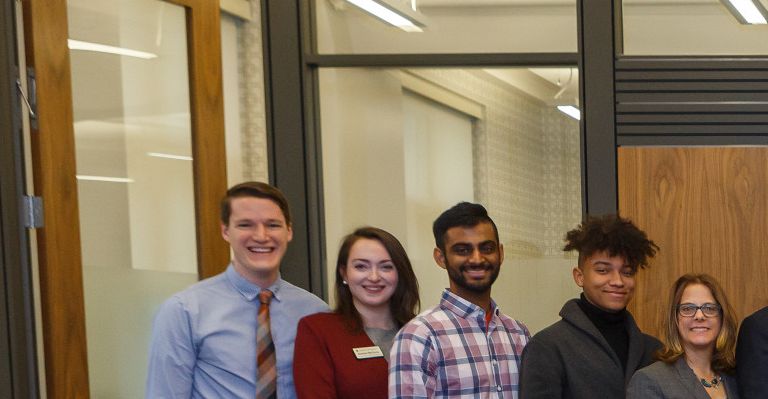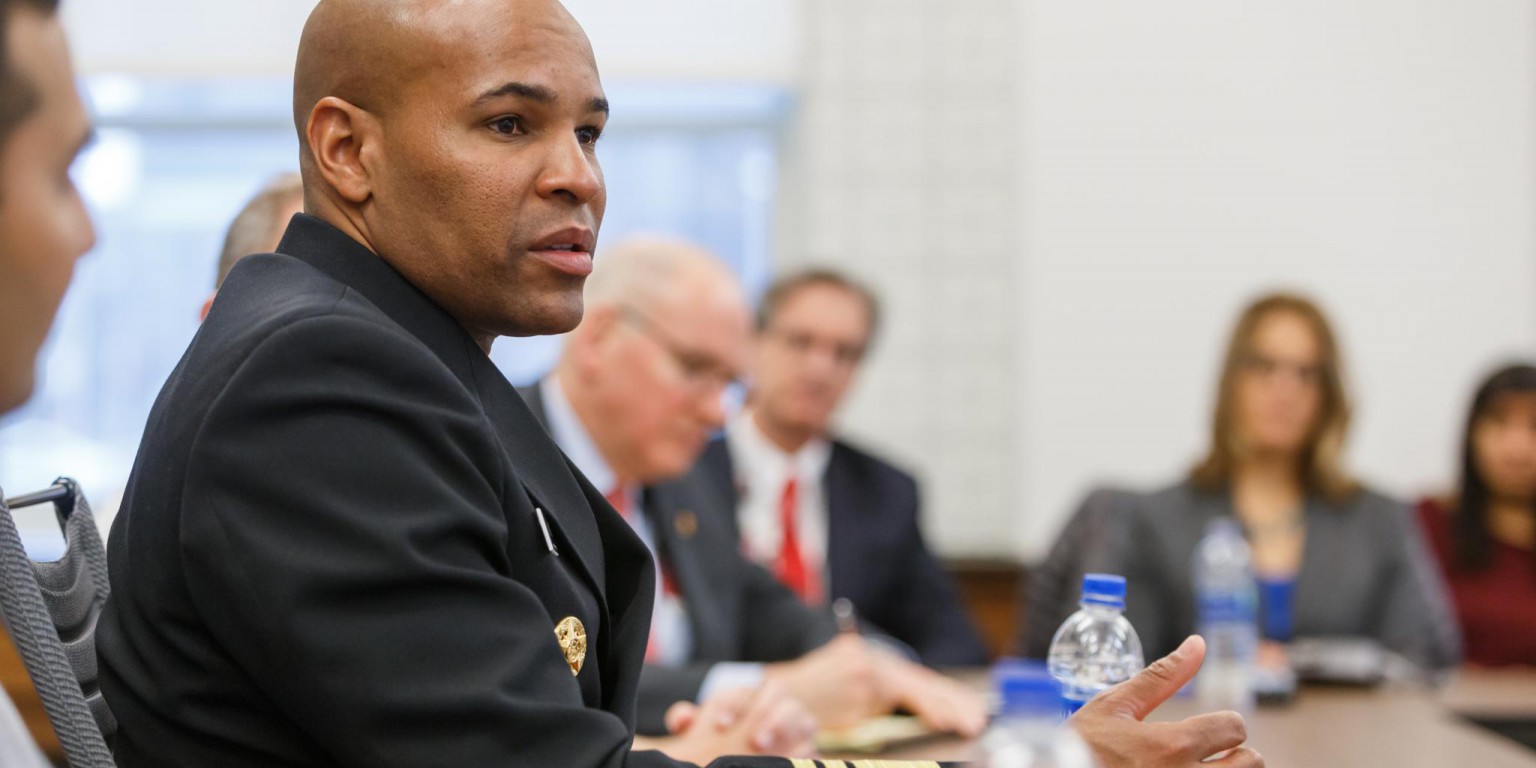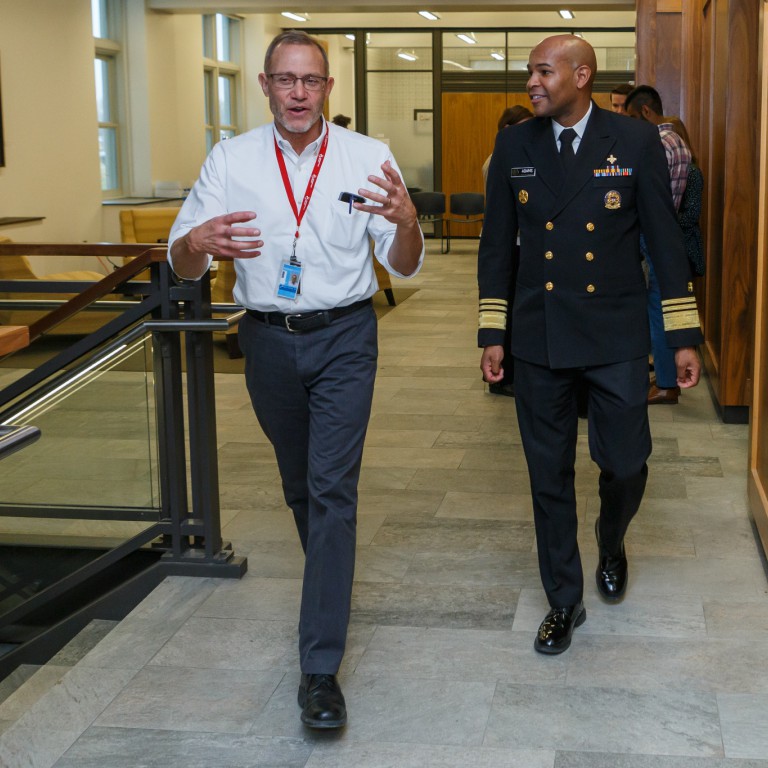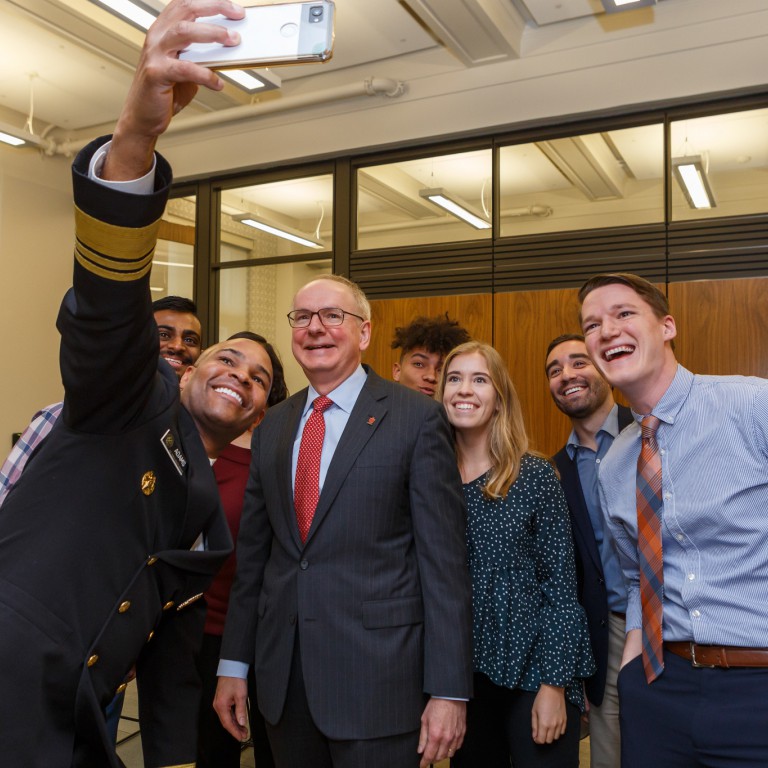
Vice Admiral Dr. Jerome M. Adams, the U.S. surgeon general, joined deans, students and leaders from throughout Indiana University on Nov. 18 in Indianapolis to discuss a wide range of health topics and the ways that their work in global health can improve U.S. health.
Adams received his medical degree in 2002 from the IU School of Medicine and previously served as Indiana State Health Commissioner.
He began the discussion, hosted by the IU Center for Global Health, by talking about the impact of social determinants of health such as transportation, housing and a safe environment.
“Health is more than health care,” Adams said. “The statistics suggest that only about 15 percent of health is impacted by your access to traditional health care.”
For the third year in a row, life expectancy in the U.S. is going down despite the country spending more than any other on health care, he said.
Adams noted that there are lessons to be learned from many countries that spend less and have better health outcomes because they are investing in other parts of health that the U.S. health care system does not. “There is a lot we can learn by comparing and contrasting global health and investments between the U.S. and other countries,” he said.
Adams said that he is passionate about global health. “There is no disease in this country right now that is more than a day’s plane ride away from us. We really need to understand that global health really is U.S. health,” he added.
Dr. Robert Einterz, director of the IU Center for Global Health, said that the center’s mission is to “awaken the inherent power of academic health centers through partnership and focusing that power on health disparities, particularly in low-resource, low-income communities, be they outside our borders or inside our borders.”
Einterz said that working both locally and globally provides unique benefits. “I am convinced that there is a synergy that happens that makes this a stronger university, a stronger health system and a stronger community,” he said.
Similarly, Adams’ motto as surgeon general is “better health through better partnerships.” As surgeon general, he is committed to maintaining strong relationships with the public health community and forging new partnerships with nontraditional partners.



Research and education leaders from the IU Center for Global Health presented the concept of reciprocal innovation and gave examples of the ways that global health innovations are working to improve health in Indiana.
Dr. Kara Wools-Kaloustian, director of research for the center, explained that reciprocal innovation is an Indiana-based model built on the concept of reverse innovation from industry. She said the concept is based on the belief that “innovation should not be going in one direction or another – it should be a continuous, team-based process.”
Wools-Kaloustian said that the concept was utilized in response to the HIV epidemic in Indiana when Adams was the state health commissioner.
“You asked us to be able to treat patients in a small town in Southern Indiana with no resources, and we said, ‘We can do this; we’ve done this for a decade in Kenya,’” said Wools-Kaloustian, who also serves as the North American director of research for the IU-led AMPATH consortium. Adams said that Scott County, Indiana, is now a national example, with one of the highest viral suppression rates in the country.
Dr. Debra K. Litzelman, director of education for the center, shared another example of using successful global health strategies: the WeCare program to reduce infant mortality rates in the 13 highest-risk ZIP codes in Central Indiana.
“We are taking the reciprocal innovation model of things we’ve learned in Kenya to our lowest-resource, highest-need areas in Central Indiana. We have hired, deployed and trained community health workers – something we have been doing in Kenya for 30 years,” Litzelman said. “We have mobilized the community health workers with laptops, iPhones and mobile offices and deployed them out and about in the community to deliver community-based interventions where they are needed most.”
Mobile health is another important component of the program.
Litzelman shared that in the first few years of the WeCare program, initial results are showing improvements in both social and mental health. Smoking and substance use are down, and breastfeeding and safe sleep practices are increasing among families in the program. Infant mortality rates and low birthweight are both down in initial results. The IU Center for Global Health is working to solidify the reciprocal innovation concept, operationalize it, and use it to solve other health problems in Indiana and in the United States.
Adams challenged those gathered to continue to focus on implementation science and equity.
“How can we take best practices from a global perspective? The more we can show that both experimenting and investing in global health has an impact on health here in the United States, and that we are doing both, not either-or, the better off we will be,” he said.
Adams said that he will be releasing a Community Health and Economic Prosperity report next year that reframes health so people understand why they should care about health disparities.
“Communities that invest in health see not only their health metrics improve, but also their economic metrics. The healthier you are, the more prosperous you will be,” he said. Additionally, Adams said, he will be releasing a call to action on maternal mortality next year.
Adams concluded the meeting by sharing one of his favorite sayings: “People need to know that you care before they care what you know.” He urged for the inclusion of those affected by a decision to be part of the decision-making process.
“I’m so proud of the work you are doing, and thank you for your support of me and the Office of the Surgeon General,” he said.

